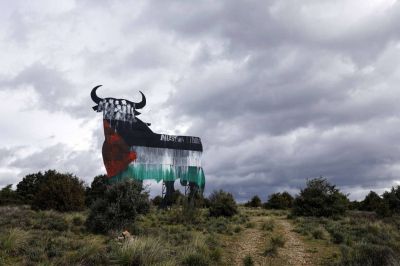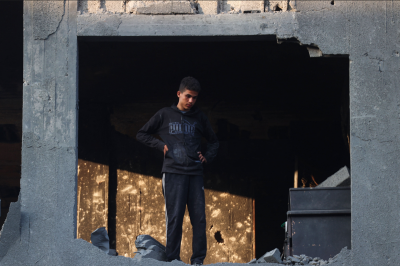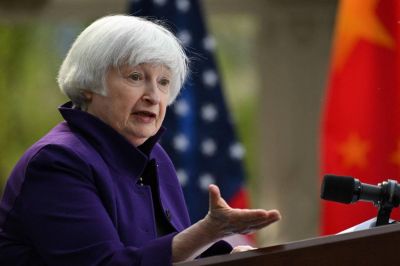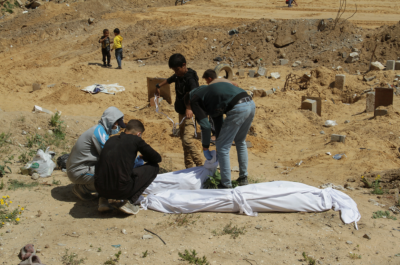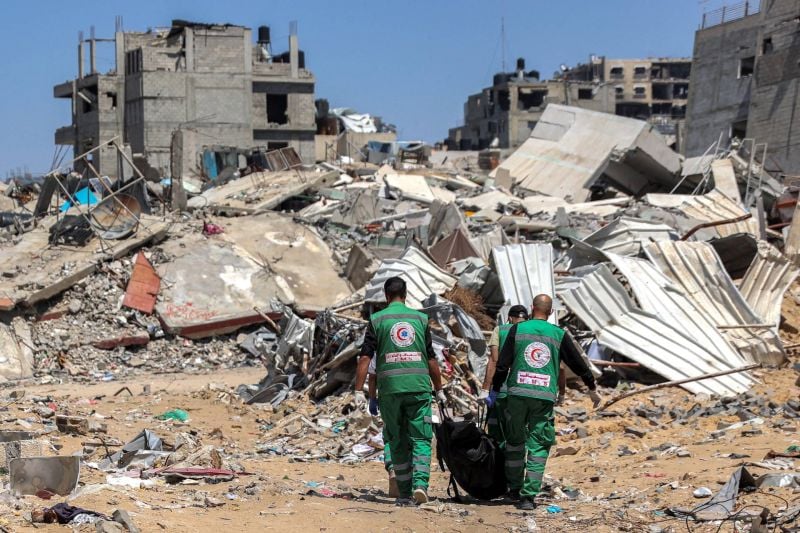
Palestinian paramedics carry away bodies of dead people uncovered in the vicinity of al-Shifa Hospital in Gaza City on April 17, 2024 after the recent Israeli military operation there amid the ongoing fighting in the Palestinian territory between Israel and the militant group Hamas. (Credit: AFP)
Just a few days before Israel’s nonstop bombardment of Gaza passed the half-year mark, Israel carried out two attacks that sparked a fervor of international condemnation.
The first was an airstrike on an Iranian consulate building in Damascus that killed several people, including a senior commander in the Revolutionary Guards’ overseas branch.
The second was a series of strikes on a convoy of World Central Kitchen aid workers in central Gaza that killed seven people. The team was mostly international — British, Polish, Australian, Palestinian and a dual US-Canadian national.
In the aftermath of these two attacks — brazen even amid Israel’s months-long onslaught on Gaza — politicians and figureheads from around the world “strongly condemned” Israel’s actions. But what effect, if any, does condemnation have on what’s happening on the ground?
Omar Shakir, the Israel and Palestine director at Human Rights Watch (HRW), says he stands firmly in the belief that, while actions may speak louder than words and condemnation alone is not sufficient, it still has an important role to play.
“The refusal to condemn something is seen as a green light,” Shakir tells L’Orient Today. “Identifying abuse is critical to the theory of change. The first step is to diagnose it.”
Shakir’s work has been critical in diagnosing systemic human rights violations. In 2019, the Israeli Supreme Court ruled to deport him from the country where, for several years, he had documented how Israel treated Palestinians as an inferior racial group, depriving them of their rights to such an extent that Shakir's 2021 HRW report found it amounted to "the crimes against humanity of apartheid and persecution.”
The UN condemned the Israeli court’s decision to ban Shakir from the country. Israel did not budge. Still, Shakir stands by the practice of denunciation.
“Condemnation is part of mobilization,” he says. If public outcry builds to a certain level, it starts to have an influence and can seriously affect a person or entity’s reputation.
“Eventually, it will affect the status quo.”
Living through rights abuses
Syrian human rights lawyer Anwar al-Bunni had been detained by the Assad regime for almost seven months by the time then-US President George W. Bush gave a speech in which he named Bunni directly and called for his immediate release.
Five months later, in April 2007, the seasoned lawyer, who had seen many of his friends forcibly disappeared while defending political prisoners and documenting systematic abuse, was then sentenced to five years in Syria’s Adra Prison for “spreading false information harmful to the State.”
That May, the US State Department named him again, saying that it “condemns” his imprisonment and calling again for his immediate release. None of this seemed to have any effect. Bunni remained in Adra, notorious for its inhumane conditions and the guards’ regular use of torture, for the full five years.
But when L’Orient Today asked him why, for example, he has stopped responding in recent years to invitations to speak to world bodies such as the UN, he says with a smile, “It’s useful, in general, but … someone else can do it. Somebody must do it, but not me.”
At the outbreak of the war in Gaza, condemnation was currency in the world of analysts and politicians. Several figures within academia had their credibility judged on whether they were willing to condemn Hamas. American political scientist and writer Norman Finkelstein, also deported and banned from Israel, made waves when he refused to condemn Hamas’ Oct. 7 attack, citing regular Israeli “operations” in Gaza — massacres with a military code name — and likening the besieged territory to a concentration camp (Finkelstein’s own parents survived the Warsaw Ghetto, Majdanek and Auschwitz).
In a recent interview on Democracy Now, Middle East analyst Mouin Rabbani criticized Washington’s practice of using condemnation as a PR band-aid while it remains firm in its pro-Israel policy.
“Words are cheap, and statements are a dime a dozen,” Rabbani said. “Israel, over the decades, has learned that it can safely ignore statements, whether by US or European decision-makers, that are essentially playing to the gallery. What really matters is not what these people say, but what they do.”
When condemnation comes without consequences, Rabbani told Democracy Now, perpetrators of abuse know they can continue to act as they wish and can safely ignore statements made against them.
A 2008 study put that idea to the test: Emilie Hafner-Burton, a professor at UC San Diego, found that “naming and shaming” countries violating human rights rarely is followed by a cessation of rights violations. Paradoxically, it is sometimes even followed by more terror. She lists several cases where condemnation has led to governments cracking down even harder on opposition voices and activists.
Hafner-Burton concludes that while naming and shaming is not “cheap talk,” abusive leaders adjust their methods of abuse in “economical ways” to repair their reputation in the “least costly way to themselves,” making small upgrades to political rights, such as holding an election, but persisting in practices of terror.
This is possible when condemnation without consequences, as Rabbani puts it, is all that the international community is willing to do. So would it have been better if they didn’t say anything at all?
A ‘basis for action’
It’s a false binary, Shakir says, to pit condemnation without action against actual action. “Condemnation creates a basis for action and makes the advocacy pitch stronger.”
Still, Shakir admits, condemnation should be consistent. “Double standards abound. There is a need for consistency. The practice is definitely uneven.” Political actors will always find it easier to condemn their adversaries than their allies, he says. It’s easier for a state or figure to condemn something if there’s not much at stake for them.
What about the imbalance? Hundreds of Palestinian aid workers have been killed in Israeli strikes on Gaza, but the world responded with a unique level of rage to the killing of six international aid workers.
Neither Shakir nor Bunni were interested in leveling any judgment against the unevenness in responses. From a law standpoint, Bunni is vehemently against playing a numbers game when it comes to justice.
“If you say, on this side they killed 1,000 and on this side they killed only five, so I will pursue the first,” says Bunni. “It might be OK for you, but it’s not OK for the victims. People look for crimes with the most victims, but even one victim deserves justice. If you cannot stand with one victim, you are not with justice.”
Since shortly after escaping Syria in 2012, through Lebanon and then to Berlin, Bunni has been involved in bringing cases of torture and abuse in Syria to Germany’s national courts, which use the doctrine of universal jurisdiction to persecute anyone regardless of their nationality or the locale of the crime. A couple of years ago, one of these cases resulted in Bunni’s own Syrian prison interrogator, Anwar Raslan, receiving a life sentence for having overseen the murder of at least 27 people and the torture of at least 4,000.
“Every criminal, whether within a state or an organization, has political protection,” Bunni explains. “Any one of them will have protection through political policies.” Condemnation helps to create an environment that allows — encourages even — victims of systemic abuse to come forward and testify against its perpetrators.
But it was not through condemnation alone that Bunni and a team of human rights lawyers brought a senior Assad government official to court for crimes against humanity for the first time since the Assad regime took power — and had him convicted. By building a case on the foundation of first-hand testimonies and witnesses, lawyers and victims ensured that Raslan would be barred from participating in a future Syria, Bunni says.
He explains how these trials may gradually remove those who uphold systems of oppression, preventing them from contributing to rebuilding the decimated country.
“They will not be able to be part of the solution, any kind of solution, because they have been persecuted as criminals. So now, no one [from the international community] can make deals with them and include them in the future of Syria.”
“This is the first time,” Bunni says emphatically, “that victims decide that criminals will no longer be protected. There is no Security Council affecting the decision, either using a veto or saying ‘We will protect this person.’”
